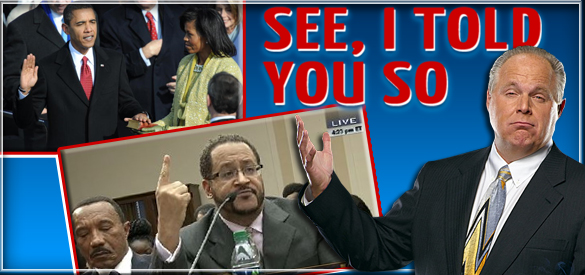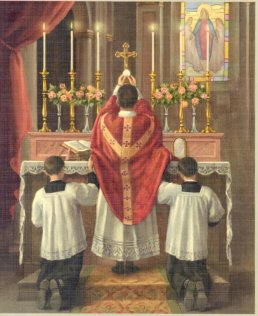Item #1 of 2 – NBC/Wall Street Journal Poll Prove Rush’s Prediction: Race Relations Have Plummeted Since The Historic Election Of Barack Obama
******************************************************************************************************
Item #2 of 2 – Negative views on race relations have also increased substantially in Obama’s 4½ years. (Article follows RUSH’S transcript)
******************************************************************************************************
Before Obama: 79% of whites had a favorable opinion of race relations
After Obama’s 4½ years:52% of whites had a favorable opinion of race relations (Drop 27 points)
******************************************************************************************************
Before Obama: 63% of blacks held a favorable view of American race relations
After Obama’s 4½ years: 38% of blacks hold a favorable view of American race relations (Drop 25 points)
******************************************************************************************************
RUSH: “The black unemployment rate in the US is currently 13.7%, six points higher than the national rate, which stands at 7.6%. So everything is worse. Everything is worse, including the one thing Obama might have actually fixed, or been able to fix. Everything regarding race is worse in this country. And I remind you, February 22nd, 2008, I, your host, predicted it.”
******************************************************************************************************

RUSH: I have a new poll here from the NBC News/Wall Street Journal, and it says that public attitudes about race relations have plummeted since the historic election of Barack Obama. Here are the numbers. Fifty-two percent of whites, 38% of blacks have a favorable opinion of race relations in the country, according to the poll, which has tracked race relations since 1994. These numbers, folks, are a sharp drop from the beginning of Obama’s first term. When Obama was immaculated in January of 2009, 79% of whites had a favorable opinion of race relations. Today it’s 52%. Sixty-three percent of blacks held a favorable view of American race relations.
So we’ve had a drop of 27 points in whites and 25 points in blacks in four and a half years, of the first black presidency in America.
You know what’s kind of stunning about this to me? You would think — and I hope all of you white people that voted for Obama hoping it was gonna end racism, that 63%, why isn’t that higher? I mean, it was truly historic. Electing the first African-American to the highest office in the land. I mean, it was an historic thing, and yet only 63% of blacks held a favorable view of American race relations at the time of the president’s immaculation. Shouldn’t that have been in the eighties? But it wasn’t. And whatever it was, it’s down 25 points after four and a half years of Obama, among the black population; 27 points in four and half years among white people.
Now, the National Association for the Advancement of Liberal Colored People, which steadfastly supports the regime, distributed pro-Obama election fliers in 2012 with lynching and Ku Klux Klan imagery. Although these efforts may have helped boost African-American turnout to record levels and deliver states like Florida and Ohio to Obama, the NAALCP’s efforts do not appear to have done much more black Americans.
The black unemployment rate in the US is currently 13.7%, six points higher than the national rate, which stands at 7.6%.
So everything is worse. Everything is worse, including the one thing Obama might have actually fixed, or been able to fix. Everything regarding race is worse in this country. And I remind you, February 22nd, 2008, I, your host, predicted it.
FROM THE BEGINNING OF THE TRANSCRIPT FROM RUSH LIMBAUGH’S SHOW TODAY July 25, 2013
BEGIN TRANSCRIPT
RUSH: Public attitudes about race relations have plummeted since the historic election of President Barack Obama, according to a new poll from NBC News and the Wall Street Journal.” In fact let’s go to the audio sound bites on this and let’s start with number 15. I want to take you back February 22, 2008, on this program. This is in the midst of the Democrat primaries.
Obama has not yet even won the Democrat nomination. In fact, Operation Chaos had not even begun, or maybe have had. If it had, we are right at the very beginnings of Operation Chaos, which was this program and this audience’s effort to keep the candidacy of Hillary Clinton alive through to the Democrat convention in 2008. We need to relive this again ’cause, folks, this was right on the money, and it sets up some things that were said on television yesterday.

RUSH ARCHIVE: “If Obama gets elected president, wouldn’t it be good to just get this done, Rush, then we could end those civil rights squabbles that we’re having?” It wouldn’t do that, folks, it wouldn’t do that. It might even exacerbate them. Let me explain how. It takes somebody like me who can read the stitches on the fastball. Let us fast forward to January of 2009.
Obama has been inaugurated president and he proposes his first bit of legislation. Let’s say that it’s — I don’t know — some civil rights-oriented thing, and a bunch of people start howling. You know that the race industry can’t wait for this. Any criticism of Obama, the first black president, is going to be met with charges of racism by the likes of the Reverends Jackson and Sharpton. It will make their race business all that much more prominent.
RUSH: The point is that back in 2008, I predicted that Obama’s election would not ameliorate race problems. It would not eliminate them. It would not remove from this country the tag of racism and slavery and racism and prejudice; it would exacerbate it, because no criticism of Obama would be permitted. Any criticism of Obama would be called racism, and I predicted it would probably get worse.
I knew, and everybody else knew, there were a bunch of white voters that were gonna vote Obama strictly hoping that doing so would end racial strife. The theory was that the election of the first black president would signal that this country’s race problems had been put to bed, and that’s why I was warning, “Ain’t no way, Jose.” It couldn’t possibly be that way because the left does not want race problems to be solved. They want them exacerbated.
Too many people make money off of racial strife, and therefore they’re always going to promote it. So the election of Obama as the first black president was a gold mine for people like Jesse Jackson and Al Sharpton. So let’s now cut to the present day. Yesterday in Washington on Capitol Hill, the Congressional Caucus on Black Men and Boys held its first hearing on “the status of black males in the US,” and during the hearing, Georgetown University sociology professor Michael Eric Dyson testified. We have three sound bites from Professor Dyson.
DYSON: The great Thomas Jefferson, the architect of Monticello and the Declaration of Independence, also wrote Notes on Virginia, where he questioned the cerebral abilities and the intellectual acuity and the reason of black people. Even as, at night, retiring from his study, engaged in relations with a young woman whose loins trapped his logic. So that the reality of our humanity being under suspicion is critical as the backdrop to understand the unfolding and evolving perception of black people in America. Our humanity has been questioned and our intelligence has been questioned.
RUSH: (chuckles) Now, for those of you in Rio Linda, I’m gonna have to translate something for you here. Professor Dyson here, Georgetown University sociology professor said of Thomas Jefferson, “even as, at night, retiring from his study, engaged in relations with a young woman whose loins trapped his logic.” I realize many of you in Rio Linda may be scratching your heads over this.
What Professor Dyson is saying here is that after Jefferson had done all these brilliant and wonderful things during the day, he picked up the nearest black slave on his plantation and headed to bed, and she enveloped him with her thighs, and what she enveloped was his male member, and the male member is where Jefferson’s logic was, according to Michael Eric Dyson.
Did you not pick that up, Dawn? Is that not clear? (interruption) Okay, you got it. Well, you’re looking like you’re in disbelief in there. (interruption) Oh, you can’t believe I’m saying it? (interruption) Oh! I thought I said it in a rather classy, erudite way. The challenge was to explain this in a way that the people of Rio Linda understood it without being vulgar. Anyway, the point is that here we are in 2013.
We have the first African-American president in office, and up until today he’s been liked and considered popular by apparently majority of the country, and all we can talk about is Thomas Jefferson and slaves. Thomas Jefferson, by the way, was a Democrat. But we can’t talk about that. We have to talk about Thomas Jefferson and what he did back then and how that’s still relevant and what Jefferson did still informs actions of today.
What Jefferson was doing is no different than what’s happening today in the United States of America.
So he rips Thomas Jefferson, and in the next bite guess who’s responsible for black-on-black crime?
DYSON: Now our friends on the right suggest it’s black-on-black crime. Where you been? We been talking about that. When Newtown happens, cameras are there. When Aurora happens, cameras are there. When Chicago happens, cameras are not there. But now we pathologize those young black people — and, by the way, black have been marching from time immemorial against the vicious legacy of white supremacy that occupies black minds that leads us to kill each other, to hate each other, to despise the very presence that we represent.
RUSH: So white supremacy, alive and kicking today in 2013 is responsible for the occupation of black minds leading to black people killing each other, leading to black people hating each other and despising their very existence. White supremacy makes all that happen. When some white kid blows up a school, cameras are there, he says. When Aurora, same thing happens, cameras are there. But when Chicago happens, cameras are not there. That’s the problem, Mr. Dyson, Professor Dyson. The problem is that what’s happening in Chicago, there doesn’t seem to be anybody concerned about it, sir. Who owns the cameras, Mr. Dyson? In what kind of cities do they own the cameras, Professor Dyson? If you asked me, it’s your buddies, liberal Democrats who own the cameras. In cities run by your buddies, liberal Democrats.
Who runs Chicago? Who runs Illinois? Who owns the media in that place? Your buddies, the Democrat Party. Why aren’t your buddies taking the cameras where you want ’em to go? The fact of the matter is, your buddies don’t want that kind of crime seen. They don’t want that kind of crime on television. That kind of crime is supposed to be uncommented upon. That kind of crime, the crime that’s happening in Chicago, we’re not supposed to see, we’re not supposed to talk about it. Nobody’s supposed to bring that up. Looks bad. Haven’t figured out a way to blame white supremacy for that. Mr. Dyson wasn’t finished. We come now to my prediction, made back on February 22nd of 2008. Here is Michael Eric Dyson again yesterday. This is at the Congressional Caucus on Black Men and Boys. First hearing on the status of black men in the United States.

DYSON: Not only could you have been Trayvon 35 years ago, you Trayvon now, right? Why? Because they are profiling Mr. Obama in the White House, asking about your transcripts from a man who’s hair is thinner even than his skin, questioning you, trumping you, in a very serious and vicious fashion. From people asking to see your birth certificate, as if you’re not American. You did it the way people said they want it to be done. You went to Columbia, graduated, Harvard Law School, graduated. You don’t wear a hood. It can’t be about a hoodie. It can’t be about the demonization of a certain kind of sartorial choice. It is about the way in which black masculinity expresses a menace and a threat in American culture, both consciously and unconsciously, that needs to be decoupled in the collective imagination of America.
RUSH: All criticism of the first black president is racist. He’s being profiled in the White House. He did it the way we whites say it’s supposed to be done, and then when he did it that way, we don’t accept it, and we don’t believe it, and we demand proof, like we do of every other president. All of them prior to this one white, by the way. At any rate, you see the anger, you hear the rage. The election of the first black president hasn’t solved anything. It sounds to me like it’s made it worse. It sounds like there’s more anger and rage out there. And, by the way, these criticisms of the president are chump change. There are substantive, ideological, policy oriented criticisms of this president that are also not permitted.
BREAK TRANSCRIPT
RUSH: I have a new poll here from the NBC News/Wall Street Journal, and it says that public attitudes about race relations have plummeted since the historic election of Barack Obama. Here are the numbers. Fifty-two percent of whites, 38% of blacks have a favorable opinion of race relations in the country, according to the poll, which has tracked race relations since 1994. These numbers, folks, are a sharp drop from the beginning of Obama’s first term. When Obama was immaculated in January of 2009, 79% of whites had a favorable opinion of race relations. Today it’s 52%. Sixty-three percent of blacks held a favorable view of American race relations.
So we’ve had a drop of 27 points in whites and 25 points in blacks in four and a half years, of the first black presidency in America.
You know what’s kind of stunning about this to me? You would think — and I hope all of you white people that voted for Obama hoping it was gonna end racism, that 63%, why isn’t that higher? I mean, it was truly historic. Electing the first African-American to the highest office in the land. I mean, it was an historic thing, and yet only 63% of blacks held a favorable view of American race relations at the time of the president’s immaculation. Shouldn’t that have been in the eighties? But it wasn’t. And whatever it was, it’s down 25 points after four and a half years of Obama, among the black population; 27 points in four and half years among white people.
Now, the National Association for the Advancement of Liberal Colored People, which steadfastly supports the regime, distributed pro-Obama election fliers in 2012 with lynching and Ku Klux Klan imagery. Although these efforts may have helped boost African-American turnout to record levels and deliver states like Florida and Ohio to Obama, the NAALCP’s efforts do not appear to have done much more black Americans. The black unemployment rate in the US is currently 13.7%, six points higher than the national rate, which stands at 7.6%. So everything is worse. Everything is worse, including the one thing Obama might have actually fixed, or been able to fix. Everything regarding race is worse in this country. And I remind you, February 22nd, 2008, I, your host, predicted it.
END TRANSCRIPT
Item #2 of 2
Negative views on race relations have also increased substantially.
Public attitudes about race relations have plummeted since the historic election of President Barack Obama, according to a new poll from NBC News and the Wall Street Journal.
Only 52 percent of whites and 38 percent of blacks have a favorable opinion of race relations in the country, according to the poll, which has tracked race relations since 1994 and was conducted in mid-July by Hart Research Associations and Public Opinion Strategies.
That’s a sharp drop from the beginning of Obama’s first term, when 79 percent of whites and 63 percent of blacks held a favorable view of American race relations.
Negative views on race relations have also increased substantially. According to the poll [pdf], 45 percent of whites and 58 percent African-Americans now believe race relations are very or fairly bad, compared with 2009, when only 20 percent of whites and 30 percent of blacks held an unfavorable view.
Although the NBC/WSJ survey addressed the politically fueled Trayvon Martin controversy only obliquely (asking how the acquittal of George Zimmerman in Martin’s shooting death had affected respondents’ views of the legal system), the survey’s historical time frame — which shows the steepest declines in positives and increases in negatives coming in the last two years — suggests the firestorm over the Martin case played a role in diminishing the high solidarity between whites and blacks that was exemplified by Obama’s election.
By November 2011, three years after Obama’s election, only 22 percent of whites and 41 percent of African-Americans believed that race relations were fairly bad or very bad. Positive views have fallen correspondingly since November 2011, when 75 percent of whites and 57 percent of blacks said race relations were either good or very good.
Obama garnered intense criticism in March 2012 for weighing in on the shooting death of Martin, announcing, “If I had a son, he’d look like Trayvon.” Obama went a step further in July 2013, after the acquittal of neighborhood watchman Zimmerman in Martin’s death, declaring, “Trayvon Martin could have been me 35 years ago.”
As The Daily Caller reported, the Obama administration’s Justice Department sent a unit with a history of anti-white racial advocacy to Sanford, Florida to help facilitate protests in the area calling for Zimmerman’s prosecution in 2012, including a major rally headlined by activist Al Sharpton.
The bitter 2012 election, which saw Obama running on a stagnating economy and his supporters mounting intense attacks on challenger Mitt Romney, may also have contributed to the souring of race relations. The National Association for the Advancement of Colored People, which steadfastly supports the Obama administration, distributed pro-Obama election flyers in 2012 with lynching and Ku Klux Klan imagery.
Although these efforts may have helped boost African-American turnout to record levels and deliver the key states of Florida and Ohio to Obama, they do not appear to have done much for black Americans. The black unemployment rate in the United States is currently 13.7 percent, more than six points higher than the national unemployment rate, which stands at 7.6 percent.
Overall, the public’s view of race-relations has fallen back to levels reported in 1994 and 2007.
The increased division is a long way from the hope for improved race relations that fueled and accompanied Obama’s 2008 victory.
“It’s all about the coalition of the willing,” Michael Stewart, a progressive activist, told The Chicago Tribune in November 2009. “I’ve come to appreciate people as individuals, not by their race [and] there’s more a focus on what we have in common than what divides us.”

